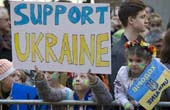Fighting intensifies in eastern Ukraine
By Maria Tsvetkova in Sloviansk, Ukraine (China Daily) Updated: 2014-05-03 07:20
Separatists down two helicopters as Kiev launches offensive to retake city
 |
| Ukraine crisis |
|
 |
| Fire at Ukraine's Odessa kills 38 |
Moscow accused Kiev of launching a "criminal" assault that wrecked hopes of peace.
Though Ukrainian forces appeared to be carrying out one of their most concerted military operations yet, their advance on the ground was limited. Nevertheless, Russian President Vladimir Putin's spokesman accused Kiev of firing on civilians from the air in a "punitive operation" that destroyed an international peace plan.
Russia was "extremely worried" about the fate of Russians in the city, including an envoy sent to help free German and other foreign hostages, the Kremlin spokesman said.
The dramatic language seems to raise the stakes, as Moscow has tens of thousands of troops massed on the border and claims the right to invade if needed to protect Russian speakers.
Journalists in Sloviansk, the most heavily fortified bastion of pro-Russian separatists in eastern Ukraine, heard shooting break out and saw one helicopter opening fire before dawn. Ten hours later, the city was largely quiet, with shops shut and armed separatists in control of the streets.
Advancing Ukrainian forces in armored vehicles took up positions closer in to the suburbs, but rebels still controlled most of the city of 130,000.
The separatist militants also made more moves on Thursday, seizing a rail control center for the Donetsk region, a railway official said, all but paralyzing train traffic.
Kiev said the firing of missiles that brought down its helicopters was evidence that Russian forces were present in the town. Moscow denies that its troops are on the ground.
The rebels aim to hold a referendum on May 11 seeking a mandate to break with Kiev, like one held in the Crimea region before Moscow annexed it in March.
For Russians, the Kremlin's rhetoric of "fascists" in Kiev launching a "punitive operation" evokes the depredations of Nazi German invaders in World War II. It is being given extensive state media coverage as next week's anniversary of the Soviet victory is used to foster national pride and nostalgia.
On the square outside city hall in Sloviansk, about 100 people gathered on Friday and said they were appealing to Putin to send troops to help.
Meanwhile, the UN Security Council plans to meet in emergency session on Friday on Ukraine after Russia called for a public meeting on the growing crisis there.
The Russian mission to the United Nations tweeted that Russia asked for what will be the council's 13th meeting on the crisis, and the spokesman's office for the UN secretary-general confirmed that the open meeting would be at noon (1600 GMT).
Putin's popularity at home has soared with the annexation of Crimea. This week he restored the Soviet-era tradition of holding a May Day parade on Red Square.
The European Union said it was watching events in eastern Ukraine with growing concern. But Kiev is not a member of NATO and Western leaders have made clear they will not fight to defend Ukraine.
US President Barack Obama and German Chancellor Angela Merkel were meeting on Friday in a planned display of trans-Atlantic unity against an assertive Russia, even as sanctions imposed by Western allies seem to be doing little to change Putin's reasoning on Ukraine.
The German chancellor comes to the White House buoyed by a decisive re-election victory late last year but facing pressure from all sides as Europe seeks to toe a hard line against Russia on Ukraine without harming its own economic interests.
As the crisis in Ukraine has deteriorated, striking fear in European capitals, Merkel has spoken to Putin perhaps more frequently than any other European leader. As such, the US sees her as a critical channel of communication with the Russian leader.
Putin's spokesman Dmitry Peskov said Putin had sent an envoy, Vladimir Lukin, to southeastern Ukraine to negotiate the release of European military observers held by the rebels, and that Lukin had not been heard from since the Ukrainian operation began.
"While Russia is making efforts to de-escalate and settle the conflict, the Kiev regime has turned to firing on civilian towns with military aircraft and has begun a punitive operation, effectively destroying the last hope of survival for the Geneva accord," he said, referring to a deal on April 17 signed by Russia, Ukraine, the United States and the European Union.
Under that agreement, separatists were supposed to lay down their arms and vacate the public buildings they have seized in about a dozen towns they have seized.
Reuters
- 4 die in renewed Ukraine fighting
- At least two killed in clash in east Ukraine, separatists say 5 dead
- Ukraine separatists stay put
- Ukraine govt mulls constitutional reform
- China welcomes Ukraine deal
- Hollande, Merkel, Van Rompuy discuss situation in Ukraine
- Three dead in east Ukraine, Putin warns of "abyss"
- Putin urges intra-Ukraine dialogue
- Four-way talks on Ukraine open in Geneva
- China calls for early launch of dialogue to resolve Ukraine crisis











